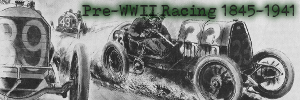















AUTO RACE CHANGES HAILED WITH APPROVAL |
|---|
 Topics: Vanderbilt Cup, French Grand Prix
Topics: Vanderbilt Cup, French Grand Prix
|
The New York Times
April 11, 1906
Grand Prix Winners in France Likely to be Seen Here.
TO BE RUN UNDER SAME RULES
Effect of the Foreign Event Upon Vanderbilt Cup Contest-No Action Against Hemery.
The action of the Racing Board of the American Automobile Association in extending the time for the closing of entries for the Vanderbilt Cup race to July 1 this year, when May 15 was the limit last season, has been reveived with favor both by American and foreign manufacturers. To home manufacturers it will afford the opportunity of testing such cars as are finished sufficiently early, so as to form some idea of their probable speed qualities. To the foreigners, and especially to the French automobilists, the time is peculiarly favorable, as it will enable them to wait until the close of the Grand Prix race before making entries.
The Automobile Club of France will be guided by the results of this event in selecting the team to come to America to defend the Vanderbilt trophy. In fact, it is generally believed that William K. Vanderbilt, Jr., during his recent visit abroad, practically agreed to this mutual understanding with the French club. If the leading five cars are selected, and all compete in this country, it will mean that the best French speed machines will be seen in the road race here, and this alone will add interest to the contest.
Notwithstanding Hemery's peculiar actions at Ormond, which led to his suspension from racing there, he is likely to be seen in the next Vanderbilt Cup race. Hemery won the cup last year with his Darracq car, and he has been named as the driver of one of the three Darracqs that have lately been entered for the Grand Prix. The American Automobile Association believed that Hemery had been punished sufficiently, and therefore declined to bring the suspension officially to the notice of the French club.
The Grand Prix, which will be the big European speed contest this year, will be run June 26 and 27 over the Sarthe course, about 100 miles southwest of Paris. The rules that have been adopted for this event have been sent to the Automobile Club of America, and they will be used as the basis upon which the revision of the American Automobile Association racing rules will be made by the special committee appointed last Monday. In all important particulars the Grand Prix rules will be the rules under which the coming Vanderbilt Cup race will be run. This fact adds another element of interest in the event for American automobilists.
Entries for this big French event close with the Automobile Club of France on April 30, and the entry fee per car is $1,000. Only nine French cars have this far been entered, but several others are being tried out for the event. No information has yet been given whether America will have an entry or not. One or two manufacturers have discussed the probability of entering, but the general indication seems to be that America will concentrate her automobile efforts this year entirely upon the Vanderbilt Cup race.
Of the French cars already entered are three Darracqs, to be driven by Hemery, Wagner and Hanriot; three Panhards, to be driven by Heath, Teste, and Tart, and three Brasier cars, to be driven by Baras, Lebrun, and Barillier. The presence of George Heath is welcome news to Americans, because that insures his probable appearance here for the third time in the Vanderbilt Cup race. He was runner-up last year and won the cup the preceding year.
The Grand Prix course is about 375 miles in length, and this will be covered once on each of the two days, making the entire distance of 750 miles. As each car finishes the first day's run it will be placed in care of an official who will guard it during the night. No work upon the car of any kind will be allowed during this interval, for all repairs must be made during the time that the race is in progress. Any car that does not finish the first day's run within four hours after the finish of the first car will be disqualified. The drivers may be changed on the second day if desired. Only two supply stations will be allotted to each competing firm on the circuit, and all necessary supplies for making repairs as well as gasoline and oil must be kept at these places and cannot be furnished from any other point on the course.
The revised racing rules of the American Automobile Association will probably be ready to present to the Racing Board next week, as Chairman Thompson has decided to call a meeting of his board early in the week.
